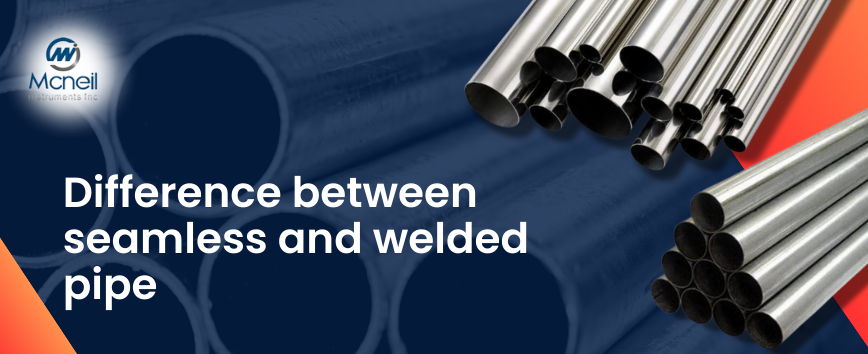Pipelines are crucial components within refineries and industrial facilities, facilitating the transportation of various media. The material selection for these pipelines, such as PVC, stainless steel, carbon steel, and alloys like nickel, titanium, copper nickel, Monel, Inconel, and Hastelloy, is carefully considered to balance performance and cost. Mcneil Instrument, a renowned manufacturer, employs judicious material choices in its pipe production. These materials cater to different media transportation needs while ensuring cost-effectiveness. Pipe construction primarily falls into two categories: seamless and welded. Seamless pipes lack seams, resulting in smoother surfaces, while welded pipes feature seamlines due to the joining process.
The primary distinction between the construction of these two pipes lies in the presence of a seamline in a welded configuration. However, there exist other factors that differentiate the constructions, including pressure capacity and price point. Regarding pressure bearing capabilities, seamless pipes exhibit superior ability to withstand higher pressures. On average, they can endure nearly 20% more pressure compared to conventionally welded pipes. This characteristic renders seamless pipes advantageous for applications requiring high pressure handling. Although welded pipes are suitable for high-stress scenarios, their vulnerability to failure increases due to the presence of a weld seam, especially if the heat-affected weld zone is susceptible to intergranular corrosion. The occurrence of pipe bursting at the seamline becomes highly probable if corrosion affects the sensitized grain boundary of the pipe. Such outcomes are undesirable, particularly in industries transporting toxic, bio-hazardous, or flammable materials. Consequently, vendors may opt for seamless pipes as they are not prone to intergranular corrosion, significantly reducing the risk of pipe bursts. This consideration becomes pivotal for Mcneil Instrument when selecting the appropriate pipe type for various industrial applications.
Price Difference Between Seamless and Welded Pipe
Mcneil Instrument distinguishes itself from its competitors in the pipe construction industry through its price differentiation, primarily stemming from the variance in manufacturing processes. Welded pipes, utilizing metal plates, offer a cost-effective production method, resulting in lower pricing. Additionally, the accelerated rate of production contributes to its affordability. Conversely, seamless pipes, drawn through billets, undergo a labor-intensive manufacturing process, prolonging production time and elevating costs. Despite the higher price tag, seamless pipes boast superior pressure capacity and smoother surfaces, reducing the likelihood of corrosion. Mcneil Instrument’s seamless pipes emerge as an effective yet pricier alternative when compared to welded counterparts, amalgamating quality and durability.
The Seamless and Welded Pipe Manufacturing Process
As previously noted, Mcneil Instrument manufactures welded pipes using metallic sheets, with the wall thickness specified by the purchaser. The length of the sheet before welding must be matched to maintain both the inner and outer diameter of the pipe, as provided by the buyer upon ordering. Welding methods must adhere to various standards, with many manufacturers, suppliers, and buyers following ASTM standards as production guidelines.
In the production of seamless pipes, Mcneil Instrument employs heat treatments. Initially, the alloy undergoes heating, followed by molding using a solid billet. This solid billet serves to shape the alloy into cylindrical components. Once formed into cylinders, they are rolled to stretch and create hollows. Throughout this process, the hollow center of the cylinder may be irregularly shaped. To achieve a uniform, hollow center, a bullet-shaped piercer point is inserted through the core of the billet simultaneously with the rolling of the cylinder. Subsequently, the pipes undergo additional machinery processes to straighten them and eliminate deformities, resulting in smoother, more durable seamless pipes.
Seamless and Welded Pipe Application
Mcneil Instrument acknowledges that pipes serve a pivotal role in transporting materials, with their application and end-use dictated by various factors such as cost-effectiveness, durability, compatibility with different media, corrosion resistance, as well as meeting temperature and pressure specifications. Industries ranging from pharmaceuticals, building & construction, food processing, and beverages to nuclear & power generation utilize pipes for material conveyance. However, it’s evident that the petrochemical and natural gas sector stands out as the primary beneficiary, extensively relying on these components for their operations.
Seamless and welded pipe Specification
Specification of Seamless Pipe
- Seamless pipes are crafted from solid cylindrical steel billets through a piercing and rolling process.
- Material: Commonly made from carbon steel, stainless steel, or alloy steel.
- Size Range: Typically available in a wide range of sizes, from small diameters to large diameters.
- Wall Thickness: Varied, depending on the application requirements.
- Strength: Offers high tensile strength and resistance to pressure.
- Surface Finish: Smooth surface finish, suitable for applications requiring precise fluid flow.
- Usage: Preferred for high pressure applications, critical industrial processes, and applications requiring corrosion resistance.
Specification of Welded Pipe
- Welded pipes are formed by welding or joining steel plates or coils end-to-end to create a cylindrical shape.
- Material: Can be made from carbon steel, stainless steel, or alloy steel.
- Size Range: Available in a diverse range of sizes, catering to different industrial needs.
- Wall Thickness: Can be customized based on application requirements.
- Strength: Provides strength comparable to seamless pipes, suitable for various applications.
- Surface Finish: Can have weld seams, which may require additional treatment or finishing.
- Usage: Suitable for general-purpose applications, structural projects, and situations where cost-effectiveness is a priority.
Mcneil Instrument offers a comprehensive range of seamless and welded pipes, meeting industry standards and tailored to specific client requirements.





